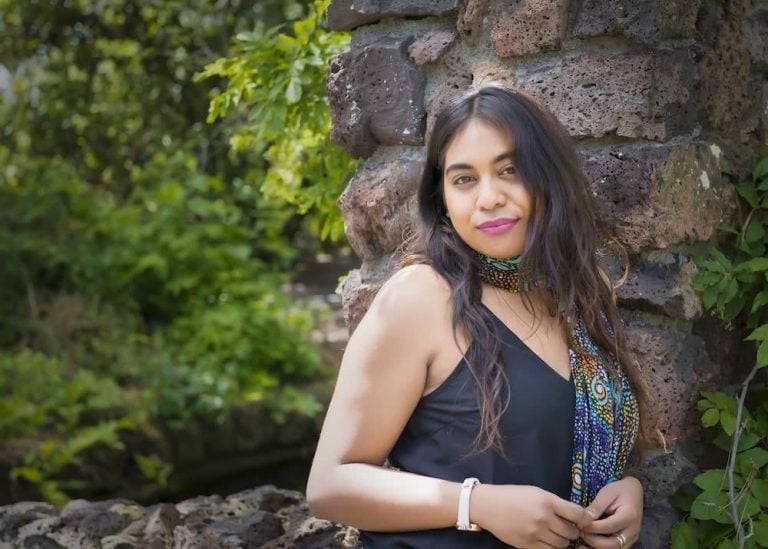At its heart, music is among the most powerful modes of storytelling. It transfers and translates our oldest traditions from generation to generation, and empowers the many rich cultural voices that make up our Australian community.
One of Australia’s brightest young musicians, Emily Wurramara, is one such modern custodian. She hails from one of Australia’s most remote indigenous communities: the Warnindilyakwa mob of Groote Eylandt, an island in the Gulf of Carpentaria. In a few short years, and at all of 21, Wurramara has performed on TedX, garnered awards and acclaim from around the country, and rightly been earmarked as one of Australia’s finest contemporary songwriters.
I’m forever inspired by the fact that I come from this really beautiful place with such a beautiful community and language.
Off the back of single release ‘Ngarrukwujenama’, a newly penned record deal with Mushroom Music, and the recent birth of her daughter K’iigari, she sat down with The BRAG to talk music, culture, and ensuring future generations can appreciate the legacy of the land.
“I’m forever inspired by the fact that I come from this really beautiful place with such a beautiful community and language,” Wurramara explains. “My childhood experiences there were so enchanting and mystical.
“Water and the environment were a constant part of my life growing up. We’d always go island hopping and swim in waterholes. My grandmother would show me the sacred islands, and our women’s Dreaming stories. She was a witch doctor, and would take me out and show me all these plants with healing properties. She taught me to use my personality and use my heart to heal people.”
Nature and healing are ever-present themes within Wurramara’s songs of being and becoming. Like the water that physically accompanied her island upbringing, the energy of the elements seeps through her music. It flows broadly through the bittersweet melody of ‘Turtle Song’, an ode to the importance of conserving our turtle habitats. And on ‘Black Boy’, her intimate cover of the Coloured Stone anthem, it floods unceasingly through her soulful, vulnerable vocals.
While her music engages us on a deeply personal level, its themes of redemption and restoration are communal experiences – themes of shared healing instilled in Wurramara from a young age.
“When I moved to Brisbane as a child, I was a very lost person. I didn’t know what world I belonged in. I felt really homesick. My mum said to me, “Why don’t you just write your feelings down?” So I did.
“I started as a writer. I voraciously read a lot of the major poets and drew ideas for my own expression, and embraced music. Music naturally developed this sense of healing to me. It’s a universal language, and a way for me to communicate and share my experiences and culture to others. A lot of the songs I sing are in my ancient language of Anindilyakwa. Through music, I can revive and preserve language and history to pass down to the next generation, so that they can listen back.”
[My grandmother] taught me to use my personality and use my heart to heal people.
Wurramara’s recent single, ‘Ngarrukwujenama’ (‘I’m Hurting’), reflects a significant change to her songwriting approach. Working closely with acclaimed producer David Bridie, the acoustic folk of first EP Black Smoke makes way for jazz-inspired song structure, Rhodes piano, and a more distinctly politicised context.
Written in response to BP’s seabed mining around her native Groote Eylandt (and 2013’s subsequent landmark victory for the Warnindilyakwa against the petroleum giant), it embodies the pain and sadness not only in people, but of the ravaged Earth.
“I’m very politically driven when it comes to nature and preserving and protecting the earth and the sea. That’s what’s always motivated me. Rather than government politics, it’s about what benefits the community and nature. We all come from the sea, and we need to protect that. You feel that sense of belonging; you feel that connection to the Earth.
“I’m also driven by being a woman. I most definitely feel that being a new mum has made me wake up to myself. What am I going to pass down to my daughter and the next generation? I always ask myself what I’m doing here, and how I can make the biggest impact … I don’t know the answer to that, and I’m not sure if I ever will. But I can share my message through the universal language of music. It doesn’t matter what language you’re singing in, so long as you feel it in your heart.”
In a global context where languages and cultures are disappearing at unprecedented levels, Wurramara’s is an important contemporary voice for all cultures. Much like her infectious laugh and broad smile, she retains an essential sense of humour and humility that cuts through the sadness and destruction. And perhaps most importantly, her music echoes the need for appreciation of language and history; a notion that, though gaining momentum, is undoubtedly obscured in our broader discussions of Australian identity.
“It’s really sad that you don’t hear any Indigenous music on the mainstream radio – there are so many wonderful Indigenous artists who never get their voice heard. That’s Australian music to me. It’s raw and real … It’s sad, too, when people overseas are more curious about your culture than many back home. I travelled to Paris and Sweden to play and the reception was really wonderful. You almost feel a bit exotic.
“One day I was visiting a friend in The Bronx in New York City. A woman called out to me and asked, ‘Where are you from, sister?’ I said, ‘I’m an Aboriginal woman from Australia.’ And she replied, ‘Oh my god, I thought Aboriginals were extinct there!’”
‘Ngarrukwujenama’ is out now.

































